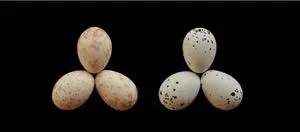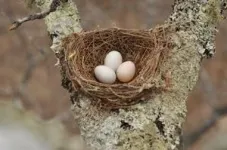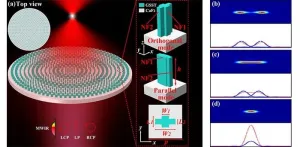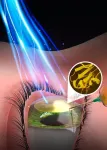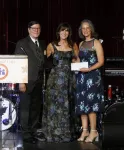(Press-News.org) DURHAM, N.C. – Shifting from a high-pressure mindset to a curious one improves people’s memory.
New research from Duke found that people who imagined being a thief scouting a virtual art museum in preparation for a heist were better at remembering the paintings they saw, compared to people who played the same computer game while imagining that they were executing the heist in-the-moment.
These subtle differences in motivation — urgent, immediate goal-seeking versus curious exploration for a future goal — have big potential for framing real-world challenges such as encouraging people to get a vaccine, prompting climate change action, and even treating psychiatric disorders.
The findings appeared online July 25 in the Proceedings of the National Academy of Sciences.
Alyssa Sinclair, Ph.D. ’23, a postdoctoral researcher working in the lab of Duke Institute for Brain Sciences director Alison Adcock, Ph.D., M.D., recruited 420 adults to pretend to be art thieves for a day. The participants were then randomly assigned to one of two groups and received different backstories.
“For the urgent group, we told them, ‘You’re a master thief, you're doing the heist right now. Steal as much as you can!’,” Sinclair said. “Whereas for the curious group, we told them they were a thief who's scouting the museum to plan a future heist.”
After getting these different backstories, however, participants in the two groups played the exact same computer game, scored the exact same way. They explored an art museum with four colored doors, representing different rooms, and clicked on a door to reveal a painting from the room and its value. Some rooms held more valuable collections of art. No matter which scenario they were pretending to be in, everyone earned real bonus money by finding more valuable paintings.
The impact of this difference in mindset was most apparent the following day. When participants logged back in, they were met with a pop quiz about whether they could recognize 175 different paintings (100 from the day before, and 75 new ones). If participants flagged a painting as familiar, they also had to recall how much it was worth.
Sinclair and her co-author, fellow Duke psychology & neuroscience graduate student Candice Yuxi Wang, were gratified after they graded the tests to see their predictions had played out.
“The curious group participants who imagined planning a heist had better memory the next day,” Sinclair said. “They correctly recognized more paintings. They remembered how much each painting was worth. And reward boosted memory, so valuable paintings were more likely to be remembered. But we didn’t see that in the urgent group participants who imagined executing the heist.”
Urgent group participants, however, had a different advantage. They were better at figuring out which doors hid more expensive pieces, and as a result snagged more high value paintings. Their stash was appraised at about $230 more than the curious participants’ collection.
The difference in strategies (curious versus urgent) and their outcomes (better memory versus higher-valued paintings) doesn’t mean one is better than the other, though.
“It’s valuable to learn which mode is adaptive in a given moment and use it strategically,” Dr. Adcock said.
For example, being in an urgent, high-pressure mode might be the best option for a short-term problem.
“If you're on a hike and there's a bear, you don't want to be thinking about long-term planning,” Sinclair said. “You need to focus on getting out of there right now.”
Opting for an urgent mindset might also be useful in less grisly scenarios that require short-term focus, Sinclair explained, like prompting people to get a covid vaccine.
For encouraging long-term memory or action, stressing people out is less effective.
“Sometimes you want to motivate people to seek information and remember it in the future, which might have longer term consequences for lifestyle changes,” Sinclair said. “Maybe for that, you need to put them in a curious mode so that they can actually retain that information.”
Sinclair and Wang are now following up on these findings to see how urgency and curiosity activate different parts of the brain. Early evidence suggests that, by engaging the amygdala, an almond-shaped brain region best known for its role in fear memory, “urgent mode” helps form focused, efficient memories. Curious exploration, however, seems to shuttle the learning-enhancing neurochemical dopamine to the hippocampus, a brain region crucial for forming detailed long-term memories.
With these brain results in mind, Dr. Adcock is exploring how her lab’s research might also benefit the patients she sees as a psychiatrist.
“Most of adult psychotherapy is about how we encourage flexibility, like with curious mode” Dr. Adcock said. “But it’s much harder for people to do since we spend a lot of our adult lives in an urgency mode.”
These thought exercises may give people the ability to manipulate their own neurochemical spigots and develop “psychological maneuvers,” or cues that act similar to pharmaceuticals, Dr. Adcock explained.
“For me, the ultimate goal would be to teach people to do this for themselves,” Dr. Adcock said. “That’s empowering.”
Support for the research came from a Duke Health Scholars Award from Duke University.
CITATION: “Instructed Motivational States Bias Reinforcement Learning and Memory Formation,” Alyssa H. Sinclair, Yuxi C. Wang, R. Alison Adcock. Proceedings of the National Academy of Sciences, July 25 2023. DOI: 10.1073/pnas.2304881120
END
One simple brain hack might boost learning and improve mental health
Curiosity supercharges people’s memory for paintings they saw while pretending to be an art thief
2023-07-25
ELSE PRESS RELEASES FROM THIS DATE:
$13.7 million NIAID grant will fund novel study on multidrug resistant organisms
2023-07-25
The National Institute of Allergy and Infectious Diseases (NIAID) has awarded a $13.7 million, five-year grant to a team of researchers to investigate multidrug resistant organisms (MDROs) in nursing homes throughout the United States.
The multidisciplinary research team includes CUNY Graduate School of Public Health (CUNY SPH) Professor Bruce Y. Lee and is led by University of California, Irvine (UCI) School of Medicine infectious diseases expert Dr. Susan Huang.
Using one of the world’s largest compilations of specimens from healthcare facilities, the team will study six antibiotic-resistant organisms deemed as serious and urgent ...
Protein found to protect females against obesity
2023-07-25
RIVERSIDE, Calif. -- Associated with poorer mental health outcomes and reduced quality of life, obesity is on the rise in the United States. Currently, more than 30% of American adults are classified as obese. A risk factor for several diseases, including diabetes, cardiovascular disease, and COVID-19, obesity is an important and growing public health concern.
Using a mouse model of high fat diet-induced obesity, a team of scientists at the University of California, Riverside, has found that, compared to males, female mice are protected against obesity and inflammation because they secrete more of an immune protein called RELMalpha.
“Our ...
Enhancing image quality with broadband achromatic and polarization-insensitive metalenses
2023-07-25
Precise control of light is a crucial requirement in optical imaging, sensing, and communication. Traditional lenses employed for the purpose have limitations, necessitating more precise and compact solutions. To address this need, researchers have developed metalenses, ultrathin lenses constructed from nanomaterials that are smaller in size than the wavelength of light. These sub-wavelength elements provide the means to manipulate light waves with exceptional precision, facilitating a precise control of the amplitude, phase, polarization, and direction of light waves.
Moreover, compared to bulky lenses, metalenses are ...
Study links alcohol-associated liver disease to abnormal cutting and rejoining of molecules
2023-07-25
SAN ANTONIO (July 25, 2023) — Alcohol consumption is a major cause of chronic liver disease. The disease, which has devastating consequences, progresses through stages of hepatitis (inflammation), fibrosis (scarring) and cirrhosis (severe scarring). Advanced disease increases the risk of developing liver cancer, and some individuals may require a liver transplant to live.
Despite a tremendous need for new treatments, the specific biological factors that determine when and how rapidly liver cells deteriorate remain largely unknown.
In a study published May 3 in the journal Hepatology, a research team at The University of Texas Health Science Center at San Antonio (UT Health San ...
Menstrual cups can help prevent infection, improve vaginal health
2023-07-25
Many girls in low- and middle-income countries struggle to buy products to manage their periods, which can cause them to skip school. So, ensuring they have access to menstrual products is critical.
A new Kenya-based study from University of Illinois Chicago researchers shows that the benefits of one kind of menstrual product — a menstrual cup — extend well beyond educational access. Teenage girls who were given menstrual cups were less likely to acquire certain kinds of vaginal infections and were more likely to have a healthy vaginal microbiome, the study found. The findings are published ...
Healing power of light: University of Ottawa team advances clear vision for eye repair
2023-07-25
An injectable biomaterial activated by pulses of low-energy blue light has tremendous potential for on-the-spot repair to the domed outer layer of the eye, a team of University of Ottawa researchers and their collaborators have revealed.
Guided by biomimetic design—innovation inspired by nature—the multidisciplinary researchers’ compelling results show that a novel light-activated material can be used to effectively reshape and thicken damaged corneal tissue, promoting healing and recovery.
This technology is a potential game-changer in corneal repair; tens of millions of people ...
Study offers objective insights to near-miss collisions between drones, airplanes
2023-07-25
Researchers have developed a new way to accurately count and objectively analyze close encounters between drones and airplanes — without depending solely on pilot sightings.
In a peer-reviewed study published by the Society of Automotive Engineers in the “SAE International Journal of Aerospace,” researchers looked at more than 1.8 million piloted aircraft operations and nearly 460,000 flights by small-uncrewed aerial systems (sUAS) around Dallas-Fort Worth Airport, a major hub.
Between August 2018 and July 2021, researchers with Embry-Riddle Aeronautical University and Unmanned Robotic Systems Analysis (URSA) identified 24 near-midair collisions (NMACs) in which ...
Department of Energy announces $4.6 million for research on public-private partnership awards to advance fusion energy
2023-07-25
WASHINGTON, D.C. - Today, the U.S. Department of Energy (DOE) announced $4.6 million in funding for 18 projects at national laboratories and U.S. universities. The awards are provided through the Innovation Network for Fusion Energy, or INFUSE, program, which was established in 2019. The program is sponsored by the Fusion Energy Sciences (FES) program office within DOE’s Office of Science and is focused on accelerating fusion energy development through public-private research partnerships.
“The latest round of INFUSE selections demonstrates the growing interest from private industry in partnering with national laboratories and U.S. universities,” said Jean ...
The Children’s Cancer Foundation, Inc. announces the 2023 CCF Research Awards
2023-07-25
The Children’s Cancer Foundation, Inc. (CCF), a 501(c)3 non-profit committed to funding locally-based researchers, programs and facilities until every child is assured a healthy cancer-free future, is pleased to announce the recipients of the 2023 CCF Research Awards. The eleven pediatric oncology researchers, each conducting work in the Baltimore-Washington region, will be presented with their grants at the 39th Annual Gala to be held November 4, 2023 at Martin’s Crosswinds in Greenbelt, MD.
The 2023 CCF Research Awards, combined with funding for local programs for children fighting cancer, total $1M.
The 2023 ...
nTIDE July 2023 Deeper Dive: Data Uncovers Disparities in COVID-19 Vaccination Rates Among Workers with and without Disabilities in Essential Work Settings
2023-07-25
East Hanover, July 25, 2023 — In a recent study conducted by the University of New Hampshire (UNH) concerning COVID-19 vaccination patterns among “essential” workers, some notable trends have emerged. During the peak of the pandemic, workers with disabilities were less likely to be vaccinated if working in the U.S. Postal Service, food and beverage stores, and correctional facilities. That’s according to experts speaking during last Friday’s nTIDE Deeper Dive Lunch & Learn Webinar.
This ...
LAST 30 PRESS RELEASES:
Jeonbuk National University researchers explore metal oxide electrodes as a new frontier in electrochemical microplastic detection
Cannabis: What is the profile of adults at low risk of dependence?
Medical and materials innovations of two women engineers recognized by Sony and Nature
Blood test “clocks” predict when Alzheimer’s symptoms will start
Second pregnancy uniquely alters the female brain
Study shows low-field MRI is feasible for breast screening
Nanodevice produces continuous electricity from evaporation
Call me invasive: New evidence confirms the status of the giant Asian mantis in Europe
Scientists discover a key mechanism regulating how oxytocin is released in the mouse brain
Public and patient involvement in research is a balancing act of power
Scientists discover “bacterial constipation,” a new disease caused by gut-drying bacteria
DGIST identifies “magic blueprint” for converting carbon dioxide into resources through atom-level catalyst design
COVID-19 vaccination during pregnancy may help prevent preeclampsia
Menopausal hormone therapy not linked to increased risk of death
Chronic shortage of family doctors in England, reveals BMJ analysis
Booster jabs reduce the risks of COVID-19 deaths, study finds
Screening increases survival rate for stage IV breast cancer by 60%
ACC announces inaugural fellow for the Thad and Gerry Waites Rural Cardiovascular Research Fellowship
University of Oklahoma researchers develop durable hybrid materials for faster radiation detection
Medicaid disenrollment spikes at age 19, study finds
Turning agricultural waste into advanced materials: Review highlights how torrefaction could power a sustainable carbon future
New study warns emerging pollutants in livestock and aquaculture waste may threaten ecosystems and public health
Integrated rice–aquatic farming systems may hold the key to smarter nitrogen use and lower agricultural emissions
Hope for global banana farming in genetic discovery
Mirror image pheromones help beetles swipe right
Prenatal lead exposure related to worse cognitive function in adults
Research alert: Understanding substance use across the full spectrum of sexual identity
Pekingese, Shih Tzu and Staffordshire Bull Terrier among twelve dog breeds at risk of serious breathing condition
Selected dog breeds with most breathing trouble identified in new study
Interplay of class and gender may influence social judgments differently between cultures
[Press-News.org] One simple brain hack might boost learning and improve mental healthCuriosity supercharges people’s memory for paintings they saw while pretending to be an art thief

